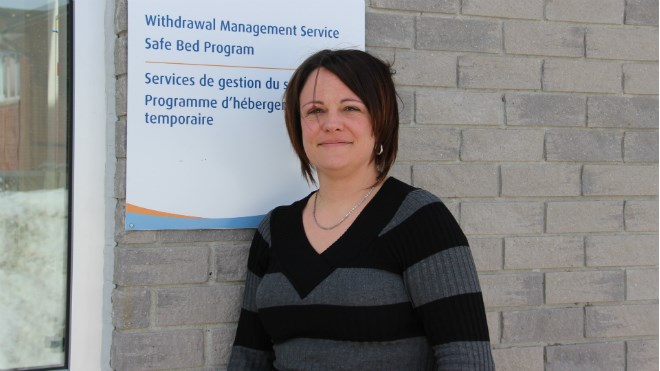Watson said she doesn't know why the need for addiction service in Sudbury has grown, but said in the past 11 months more than 1,800 people have used its programs.
The Withdrawal Management Service, located at 336 Pine St., accepts people who are under the influence of drugs and alcohol, or who are in the acute intoxication stage, even if they have only been sober for only a day or two.
All clients arrive voluntarily, but in many cases, it is police, the hospital emergency department, or other agencies that refer people to the service.
The program operates 24 hours a day, and has 20 staff members who help clients deal with withdrawal symptoms in a safe environment.
Those symptoms often resemble a bad flu, and can include nausea, diarrhea and tremors.
Because the service is not in a medical facility, staff can't prescribe medication to help with withdrawal symptoms, but they can help clients manage medication that has already been prescribed.
The facility is often local addicts' first point of contact with social services, which refers willing clients to treatment programs in Sudbury and across the province.
Since December 2013, more and more clients have had to leave Sudbury to receive the treatment they need.
On Dec. 19, the Salvation Army's addictions treatment program in downtown Sudbury ended.
Perry Kayes, a senior addictions counsellor who worked at the Salvation Army for 19 years before the program closed, said it used the 12-step model developed by Alcoholics Anonymous – and had a success rate of around 80 per cent.
There are plans for two local agencies – Iris Addiction Recovery for Women and Rockhaven – to jointly create a new addictions treatment program using $345,000 in funding the Salvation Army received previously from the North East Local Health Integration Network.
Kathryn Irwin-Seguin, the CEO of Iris Addiction Recovery for Women, told Northern Life in December they were in the process of developing the program, and that it would be ready in early 2014.
But Watson said as of March 12, the new program had not yet launched.
“There have been talks about getting something going in the city as far as men's treatment, but nothing has been developed as of yet,” she said.
The biggest barrier to recovery for people who suffer from drug and alcohol addiction, is a lack of followup and proper case management in the community, said Watson.
She said many clients are referred to treatment programs where they do very well. But once the program is complete, they return to the same environment that fostered their addiction in the first place.
Many people who show up at the Withdrawal Management Service's front door don't have proper housing, Watson said.
Keeping up with daily tasks, like buying groceries and paying the bills, can be the things that throw them over the edge, she said. If more case managers could follow a recovering addict's progress, it would greatly reduce their chances of a relapse.
Join Sudbury.com+
- Messages
- Post a Listing
- Your Listings
- Your Profile
- Your Subscriptions
- Your Likes
- Your Business
- Support Local News
- Payment History
Sudbury.com+ members
Already a +member?
Not a +member?
Sign up for a Sudbury.com+ account for instant access to upcoming contests, local offers, auctions and so much more.
